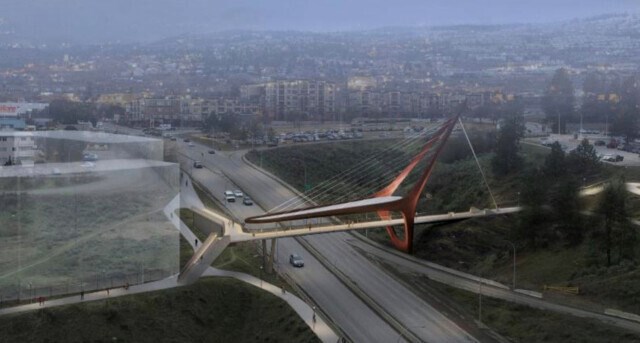Kamloops city council wants to see headway soon on a $10-million pedestrian overpass spanning Summit Drive, voting Tuesday to tell project partner Thompson Rivers University it isn’t interested in further deliberations over whether to change the location of the bridge.
The cost of the pedestrian and bicycle overpass is intended to be split equally between TRU and the City of Kamloops. Last spring, council decided to allocate $5 million in provincial funding to the project.
However, council heard Tuesday that the city and TRU have yet to come to an agreement on a location for the bridge.
"I'm bothered by TRU, which said in 2023 that this could be built in two years — so we were gung-ho. … Now they’re playing games, now they’re talking of other locations,” said Coun. Dale Bass.
“I only voted for it because I thought it was going to happen. When I start hearing partners we're dealing with saying, 'Well, let's talk about this, let's talk about that, maybe let's get another study,’ I start wondering if anything's ever going to happen.”
Multiple studies commissioned
Purvez Irani, City of Kamloops transportation manager, told council the Summit Drive overpass has been on TRU and the city’s master plans since 2010. Separate engineering studies were undertaken in 2012 and 2022, both of which recommended the same location for the span out of three possibilities.
After council decided to allocate provincial funding toward the bridge, Irani said TRU asked the city about looking into an alternate location along Summit Drive.
“Most recently, we were informed by TRU that they have hired a consultant, because the wish is that we should do another independent review for the project location,” Irani said.
The results of TRU’s study are expected in April.
Irani told council the city is confident in its proposed bridge location based on the two engineering reports it has received from “very capable multinational firms.”
Coun. Nancy Bepple said she believes the location, which has been proposed twice in 13 years, is the place the overpass should be built.
“I just hope that TRU doesn’t give up on this great opportunity to have half of it paid for by essentially the taxpayers of Kamloops — and it will benefit everybody,” Bepple said.
City letter headed to TRU
Council voted 8-1 in favour of a motion put forward by Coun. Katie Neustaeter proposing a letter go to TRU seeking clarity on the study’s purpose and making it clear the city will not consider changing the project's location — and they aren’t interested in waiting until April to find out what the new study says.
Mayor Reid Hamer-Jackson was the only vote opposed, stating he felt the issue would be better dealt with by city staff.
“Enough is enough,” said Coun. Mike O’Reilly, noting the city could be allocating the millions of dollars to another active transportation project.
“Either you decide you want to do something with this or you don’t — and that’s fine either way. But we can’t just keep playing the never never plan, doing independent studies that’s just going to come back favouring what TRU wants.”
TRU vice-president responds
No one from the university was present to respond or answer questions at Tuesday's council meeting, so Castanet Kamloops asked Matt Milovick, TRU's vice-president of administration and finance, to provide his take on the situation.
He said the university doesn’t have enough information to make a $10-million decision, which is why it commissioned an independent third-party review on its own dime. He said TRU has invited city staff to participate in the process.
“I want to be real clear on this point, and it's a point that needs to be made — we’re agnostic about the location of the bridge. It could be north, it could be south, it could be middle, we don't care — as long as there's data and research that supports that $10-million decision,” Milovick said.
"We want to make sure that people are using it and that people will use it, and that it doesn't become a $10-million artifact that no one uses and doesn't make the right connections.”
'Ultimatum' could kill deal
He said the previous studies didn’t take into account things like the expected growth of the TRU campus, and how students and residents will move through the area. The study, currently underway, will help TRU better understand how the infrastructure can be built to serve the community in the future.
“I understand they've put an ultimatum in front of us to either agree to the bridge — agree to the location they have selected for us — or the deal is off," he said.
"And if that's the ultimatum, I would say at this point the deal is off."
Milovick said he hopes the letter is not actually an ultimatum, and that the city and the university can reach an agreement on the overpass. He said the university “doesn’t play games,” it makes evidence-based decisions.
“I think this is the right project for the city and the university and could be a really excellent example of collaboration between a civic partner in a post-secondary institution, which I think is really important to the city,” he said.
“But I guess we'll see where it goes.”



